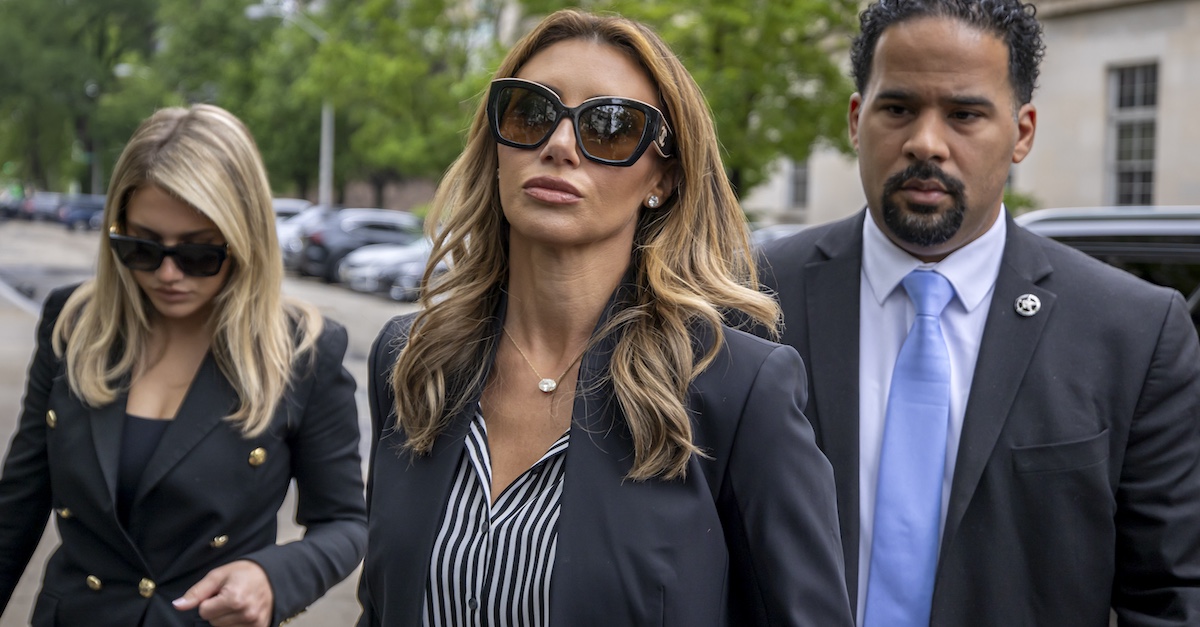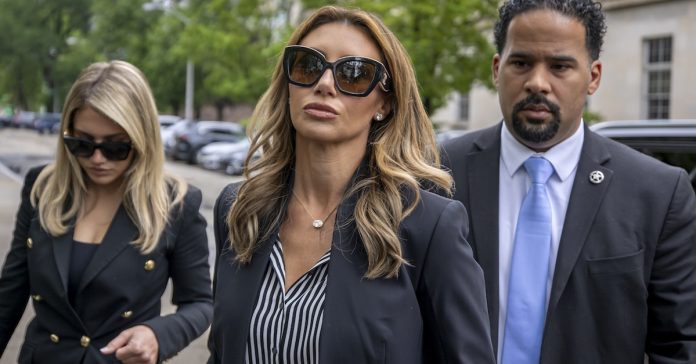
NEWARK, NEW JERSEY – MAY 15: Alina Habba, Acting U.S. Attorney for the District of New Jersey, arrives at the courthouse where Mayor of Newark, Ras Baraka”s hearing will be held on May 15, 2025 in Newark, New Jersey (Sipa via AP Images).
The DOJ has launched a full-throated defense of Alina Habba’s authority as acting U.S. attorney for New Jersey and urged an appeals court to “reverse” Habba’s disqualification from prosecuting criminal defendants who so far have successfully challenged the legality of her appointment.
Noting that the 3rd U.S. Circuit Court of Appeals’ eventual ruling could affect at least seven other New Jersey cases in addition to the cases against Julien Giraud Jr., Julien Giraud III, and Cesar Pina, the DOJ asserted that Middle District of Pennsylvania’s Chief U.S. District Judge Matthew Brann got it wrong in August when he barred Habba from prosecuting the named challengers because she was not “lawfully performing the functions and duties of the office of the United States Attorney for the District of New Jersey[.]”
Habba, a Donald Trump loyalist and formerly his personal attorney, was first named interim U.S. attorney in March. It was a temporary role that came with a 120-day stint in office, unless she was confirmed by the Senate or appointed by a federal court. As her nomination languished in the Senate and as the clock ticked down on Habba’s interim tenure in July, federal judges ultimately declined to appoint her and instead named her then-first assistant Desiree Grace as U.S. Attorney.
U.S. Attorney General Pam Bondi, claiming that “politically minded” and “rogue judges” had interfered with Trump’s “core Article II powers,” swiftly fired Grace. After Trump pulled Habba’s nomination as permanent U.S. attorney, Habba resigned as interim U.S. attorney and was appointed simultaneously to the ousted first assistant’s position under the Federal Vacancies Reform Act (FVRA), making her the top prosecutor again. At the same time, in the event that legal authority was challenged, Habba was named a “Special Attorney to the United States Attorney General” under a federal statute governing the commission of special attorneys, giving her the power to act as a U.S. attorney through another means as the office’s supervisor.
The Girauds and Pina responded by challenging Habba’s authority, as defendants in different states have done to question other Trump acting U.S. attorney picks.
Love true crime? Sign up for our newsletter, The Law&Crime Docket, to get the latest real-life crime stories delivered right to your inbox.
In his ruling, Brann declined to toss out the Girauds’ and Pina’s indictment, but he still found the executive branch had used “a novel series of legal and personnel moves” to keep Habba in place and that she was not “lawfully performing the functions and duties” of the office she claimed. He further ordered Habba disqualified from “engaging in the prosecutions of the Girauds and Mr. Pina, and from supervising the same.”
The judge, adding that the same would apply to “[a]ny Assistant United States Attorney” coming to court under Habba’s authority or supervision, ruled that at its most “extreme,” Trump and Bondi had claimed a power with “historical practice” to permanently sidestep the Senate and indefinitely install anyone “of his personal choice for an entire term.”
“Inferring Congress’s acquiescence from a historical record this thin and contradictory is simply untenable,” said Brann.
The DOJ stated Friday that Brann “erroneously disqualified” Habba and that the decision may “upend widespread and longstanding executive practice.”
Calling the case an “unusual situation” where a federal court declined to appoint Habba and “could not agree” with Trump “on the best person for the job,” the DOJ said Brann “erred” in embracing an “unprecedentedly narrow view of who can serve as an acting official under the FVRA.” The judge also wrongly held that AG Bondi “cannot delegate her concurrent or independent authority” to put Habba in a supervisory role over the U.S. Attorney’s Office, the brief said.
Making the case that Habba was lawfully appointed as first assistant following Grace’s firing, the DOJ said Brann’s “contrary conclusion” has serious implications for both past acting appointments spanning decades and future appointments.
“The district court’s contrary conclusion would mean that every presidential administration for more than two decades has unlawfully installed dozens of acting officials—a consequence that the district court openly embraced,” the brief said, before stating that Brann threatens to “cripple the functioning of government” in another way: not being able to lawfully fill vacancies temporarily in some “1,000 offices in the Executive Branch that require appointment by the President and confirmation by the Senate (‘PAS’ offices).”
“The district court’s holding also conflicts with longstanding executive practice that has been accepted by every branch of the federal government and would cripple the functioning of government when a PAS office is vacant and no acting official may lawfully serve,” the brief argued. “It is important that a DOJ component is overseen by someone who has the support of the Executive Branch, and that a U.S. Attorney’s Office can continue to function even when there is no Senate-confirmed or interim U.S. Attorney.”
“The district court’s contrary holdings misread the FVRA and would upend widespread and longstanding executive practice across the federal government. The district court’s disqualification orders should be reversed,” the DOJ concluded.
Colin Kalmbacher contributed to this report.

